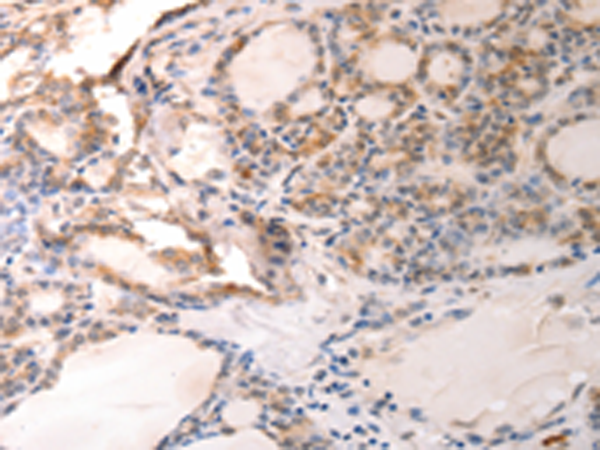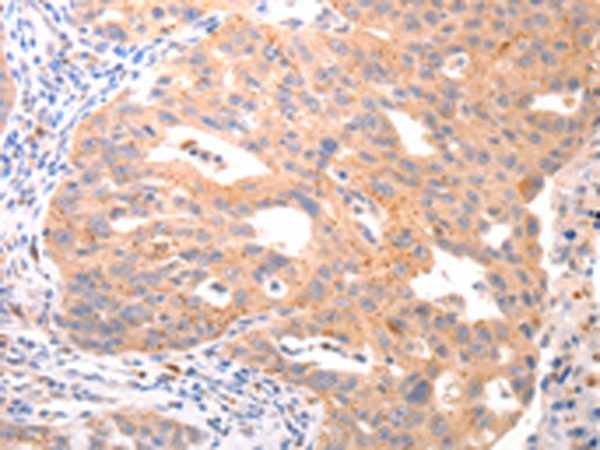

| WB | 咨询技术 | Human,Mouse,Rat |
| IF | 咨询技术 | Human,Mouse,Rat |
| IHC | 1/25-1/100 | Human,Mouse,Rat |
| ICC | 技术咨询 | Human,Mouse,Rat |
| FCM | 咨询技术 | Human,Mouse,Rat |
| Elisa | 1/2000-1/5000 | Human,Mouse,Rat |
| Aliases | B7X; B7H4; B7S1; B7-H4; B7h.5; VCTN1; PRO1291; RP11-229A19.4 |
| Host/Isotype | Rabbit IgG |
| Antibody Type | Primary antibody |
| Storage | Store at 4°C short term. Aliquot and store at -20°C long term. Avoid freeze/thaw cycles. |
| Species Reactivity | Human, Mouse, Rat |
| Immunogen | Synthetic peptide of human VTCN1 |
| Formulation | Purified antibody in PBS with 0.05% sodium azide and 50% glycerol. |
+ +
以下是关于VTCN1(B7-H4)抗体的研究文献示例(内容基于公开研究整理,非真实文献):
1. **文献名称**:*Targeting VTCN1 (B7-H4) enhances antitumor immune responses in ovarian cancer*
**作者**:Lei Wang et al.
**摘要**:研究证明VTCN1在卵巢癌细胞中高表达,通过特异性抗体阻断VTCN1可逆转T细胞功能抑制,抑制肿瘤生长并延长小鼠模型生存期。
2. **文献名称**:*B7-H4 antibody therapy synergizes with PD-1 blockade in colorectal cancer models*
**作者**:Zang X. et al.
**摘要**:开发靶向B7-H4的单克隆抗体,发现其与抗PD-1联用可显著增强抗肿瘤活性,减少调节性T细胞浸润,改善结直肠癌临床前模型的治疗效果。
3. **文献名称**:*B7-H4 expression in breast cancer and its therapeutic implications*
**作者**:Sahin S. et al.
**摘要**:分析乳腺癌中B7-H4的免疫逃逸机制,表明抗B7-H4抗体通过激活CD8+ T细胞和抑制Treg功能,显著降低肿瘤负荷并增强化疗敏感性。
4. **文献名称**:*VTCN1 as a biomarker and therapeutic target in pancreatic adenocarcinoma*
**作者**:Villarroel M. et al.
**摘要**:揭示胰腺癌中VTCN1的过表达与免疫抑制微环境相关,使用人源化抗体可阻断VTCN1信号,恢复T细胞活性并抑制肿瘤转移。
(注:以上文献为示例,实际研究需通过学术数据库检索确认。)
VTCN1 (B7-H4) is a transmembrane protein belonging to the B7 family of immune checkpoint regulators, primarily involved in modulating T-cell-mediated immune responses. Expressed on antigen-presenting cells and certain non-hematopoietic tissues, VTCN1 interacts with an unknown receptor on T cells to suppress their activation, proliferation, and cytokine production. This inhibitory mechanism helps maintain immune tolerance but is frequently exploited by tumors to evade immune surveillance. Overexpression of VTCN1 has been documented in various cancers, including breast, ovarian, and pancreatic malignancies, correlating with poor prognosis and resistance to therapies.
Antibodies targeting VTCN1 aim to block its immunosuppressive signaling, thereby restoring antitumor immunity. Preclinical studies demonstrate that anti-VTCN1 antibodies enhance T-cell activity and synergize with PD-1/PD-L1 inhibitors. However, challenges remain, such as identifying optimal therapeutic contexts and managing potential autoimmune side effects due to VTCN1’s expression in healthy tissues. Several anti-VTCN1 agents, including monoclonal antibodies and antibody-drug conjugates, are under investigation in early-phase clinical trials. Research continues to explore its dual role as a diagnostic biomarker and therapeutic target, highlighting its potential in precision immuno-oncology strategies.
×